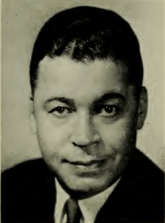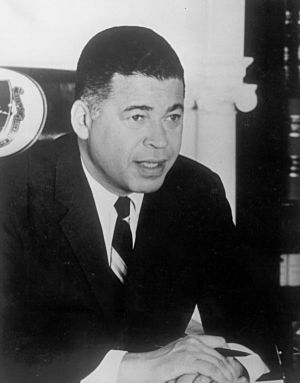Edward Brooke facts for kids
Quick facts for kids
Edward Brooke
|
|
|---|---|
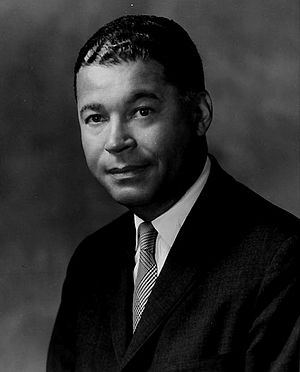
Official portrait, c. 1967
|
|
| United States Senator from Massachusetts |
|
| In office January 3, 1967 – January 3, 1979 |
|
| Preceded by | Leverett Saltonstall |
| Succeeded by | Paul Tsongas |
| 35th Attorney General of Massachusetts | |
| In office January 3, 1963 – January 3, 1967 |
|
| Governor | |
| Preceded by | Edward McCormack |
| Succeeded by | Edward T. Martin |
| Personal details | |
| Born |
Edward William Brooke III
October 26, 1919 Washington, D.C., U.S. |
| Died | January 3, 2015 (aged 95) Coral Gables, Florida, U.S. |
| Resting place | Arlington National Cemetery |
| Political party | Republican |
| Spouses |
|
| Children | 3 |
| Education |
|
| Awards | Presidential Medal of Freedom (2004) Congressional Gold Medal (2008) |
| Military service | |
| Allegiance | |
| Branch/service | |
| Years of service | 1941–1946 |
| Rank | |
| Unit | 366th Infantry Regiment |
| Battles/wars | |
Edward William Brooke III (October 26, 1919 – January 3, 2015) was an American lawyer and politician. He was a member of the Republican Party. He represented Massachusetts in the United States Senate from 1967 to 1979. After winning his election in 1966, he became the first African American to be elected to the U.S. Senate by a popular vote. Before becoming a Senator, he was the Attorney General of Massachusetts from 1963 to 1967.
Edward Brooke grew up in Washington, D.C.. He came from a middle-class Black family. He went to Howard University and then to Boston University School of Law. He graduated in 1948. Before that, he served in the U.S. Army during World War II.
He started his political career in 1950. He ran for a seat in the Massachusetts House of Representatives. Later, he became the chairman of the Boston Finance Commission. In 1962, Brooke was elected Attorney General. This made him the first African American to be elected attorney general in any state.
He served as Attorney General for four years. Then he ran for the Senate in 1966. He won against the Democratic Governor Endicott Peabody. He started his term on January 3, 1967. In the Senate, Brooke was known as a liberal Republican. He helped write the Civil Rights Act of 1968. This law made housing discrimination illegal. He was re-elected for a second term in 1972.
Brooke became a strong critic of Republican President Richard Nixon. He was the first Republican Senator to ask Nixon to resign because of the Watergate scandal. In 1978, he ran for a third term but lost to Paul Tsongas. After leaving the Senate, Brooke worked as a lawyer. He was also involved with different businesses and non-profit groups. Edward Brooke passed away in 2015 at age 95.
Early Life and Education
Edward William Brooke III was born on October 26, 1919. His birthplace was Washington, D.C.. His father, Edward William Brooke Jr., was a lawyer. His mother was Helen Brooke. Edward was the second of three children.
He grew up in a time when Black and white communities were often kept separate. He attended Dunbar High School. This was a top academic high school for African Americans. He graduated in 1936. After high school, he went to Howard University. He first thought about studying medicine. But he chose to study social studies and political science instead. He earned his bachelor's degree in 1941.
Military Service in World War II
Right after the Attack on Pearl Harbor, Brooke joined the United States Army. He became a second lieutenant. He fought in Italy as part of the 366th Infantry Regiment. This unit was segregated, meaning it was made up only of Black soldiers.
Brooke spent 195 days with his unit in Italy. He spoke fluent Italian. His lighter skin helped him cross enemy lines. He could talk with Italian partisans. By the end of the war, he was a captain. He also received a Bronze Star Medal and a Distinguished Service Award.
His time in the army showed him the unfairness and racism in the military. After the war, he graduated from the Boston University School of Law in 1948. He later said he studied very hard at Boston University.
Starting His Political Career
After law school, Brooke opened his own law practice in Boston. In 1950, he decided to enter politics. Friends from his army unit encouraged him. He ran for a seat in the Massachusetts House of Representatives. He ran in both the Democratic and Republican primaries. He won the Republican nomination. But he lost the main election. He ran again two years later and lost again.
In 1960, Brooke ran for secretary of state. He won the Republican nomination. This made him the first Black person nominated for a statewide office in Massachusetts. However, he lost the election. His opponent's campaign used a slogan that played on Brooke's race.
Even though he lost, Republican leaders noticed Brooke's potential. Governor John Volpe offered him several jobs. Brooke wanted a position with more political importance. He accepted the role of chairman of the Boston Finance Commission. In this job, he investigated money problems and found corruption in city government. The news praised him for bringing life back to the agency.
His success led him to run for Attorney General of Massachusetts in 1962. He won, becoming the first African American elected attorney general in any state.
As Attorney General, Brooke became known for fighting organized crime and corruption. He successfully prosecuted several officials from the governor's administration. In 1964, he disagreed with his party's presidential nominee, Barry Goldwater. Brooke publicly told Republicans not to support Goldwater. This actually helped Brooke win re-election in 1964. He won by a very large number of votes.
Brooke continued to criticize Republicans. But he also suggested ways to improve the party. He wanted them to focus on important issues for everyday people. By 1965, Brooke was a main Republican voice for racial equality.
Serving in the U.S. Senate
First Term (1967–1973)
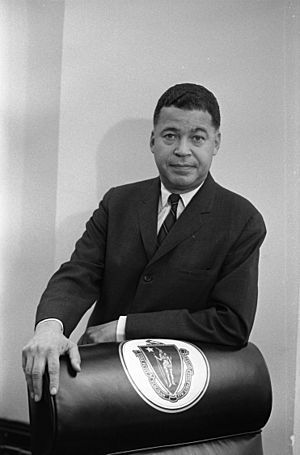
In 1966, Brooke defeated former Governor Endicott Peabody. Brooke received many more votes. He served as a U.S. Senator for two terms. His terms were from January 3, 1967, to January 3, 1979. The number of Black voters in Massachusetts was small. So, their votes did not greatly affect the election. Brooke said he did not plan to be "a national leader of the Negro people." But his historic election gave him support across the country.
What He Did in the Senate
Brooke was a moderate-to-liberal Republican. He led a group of progressive Republicans called the "Wednesday Club." They met to discuss ideas and plans. Brooke often disagreed with President Richard Nixon on social issues and civil rights. In 1967, he received the Spingarn Medal from the NAACP.
In 1967, Brooke visited Vietnam to learn more about the war. After his trip, he changed his mind about the Vietnam War. He began to support President Johnson's careful approach. He believed the enemy was not ready for talks.
By his second year, Brooke was a strong supporter of fair housing. He worked with Walter Mondale, a Democrat from Minnesota. They co-authored the 1968 Fair Housing Act. This law made it illegal to discriminate in housing. President Johnson signed it into law on April 11, 1968. This was one week after Martin Luther King Jr. was assassinated. Brooke wanted stronger ways to enforce the law. He proposed them many times.
In 1969, Congress passed the "Brooke Amendment." This law limited how much poor families had to pay for public housing. It said they should pay no more than 25 percent of their income for rent. Brooke also voted to approve Thurgood Marshall for the U.S. Supreme Court.
During Nixon's presidency, Brooke fought against attempts to cut programs. These included the Job Corps and the Office of Economic Opportunity. He also worked to strengthen the Equal Employment Opportunity Commission. These programs were important parts of President Lyndon Johnson's "Great Society."
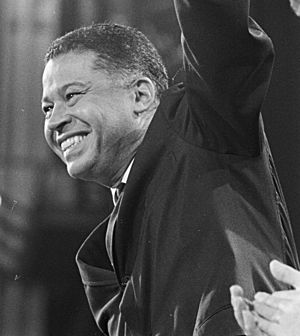
In 1969, Brooke spoke at Wellesley College. He spoke against "coercive protest." Some students thought he was criticizing protesters. Hillary Rodham, then a student leader, spoke after him. She defended the importance of protest. This made her famous in Life magazine.
Brooke voted to approve Warren E. Burger as Chief Justice of the United States in 1969. He also led a group that stopped two of President Nixon's Supreme Court nominees. These were Clement Haynsworth and Harrold Carswell. He voted for Harry Blackmun and Lewis F. Powell Jr. to the Supreme Court. But he voted against William Rehnquist. In 1975, he voted for President Gerald Ford's nominee, John Paul Stevens.
Second Term (1973–1979)
His Relationship with the White House
Even though Brooke disagreed with Nixon, the president respected him. After Nixon's election in 1968, Nixon offered Brooke a cabinet position. He also offered him the job of ambassador to the UN. People even talked about Brooke possibly replacing Spiro Agnew as Nixon's running mate in the 1972 election. But Nixon kept Agnew. Brooke was re-elected in 1972. He won against John J. Droney by a large margin.
What He Did in His Second Term
Brooke was the first Republican to ask President Nixon to resign. This happened on November 4, 1973. It was after the Watergate scandal and the "Saturday night massacre." He repeated this request to Nixon in person on November 13, 1973.
He became a top Republican on the Senate Banking Committee. He also served on two important subcommittees for spending. From these positions, Brooke protected and strengthened programs he supported. For example, he helped pass the Equal Credit Opportunity Act. This law gave married women the right to get credit in their own name.
In 1974, Brooke worked with Senator Birch Bayh. They fought to keep Title IX. This was a 1972 law that ensures equal education opportunities. This includes sports for girls and women.
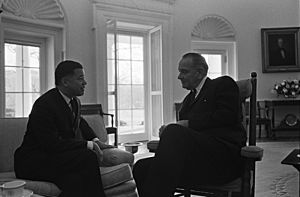
In 1975, the Voting Rights Act was up for renewal. Brooke debated Senator John C. Stennis and won. The Senate supported extending the law.
In his 1978 re-election campaign, Brooke lost to Paul Tsongas.
Life After the Senate
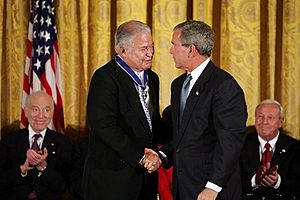
After leaving the Senate, Brooke worked as a lawyer in Washington, D.C. He was also chairman of the board for the National Low Income Housing Coalition. In 1984, he became chairman of the Boston Bank of Commerce. A year later, he joined the board of directors for Grumman.
In 1996, Brooke became the first chairman of the World Policy Council. This group is part of Alpha Phi Alpha, an African-American fraternity. The Council works to expand the fraternity's involvement in politics and social issues globally.
On June 20, 2000, a new courthouse in Boston was named after him. The Edward W. Brooke Courthouse is part of the Massachusetts court system. It houses several important courts. In 2002, scholar Molefi Kete Asante included Edward Brooke in his list of 100 Greatest African Americans.
In September 2002, he was diagnosed with breast cancer. He then helped raise awareness about male breast cancer. On June 23, 2004, President George W. Bush gave Brooke the Presidential Medal of Freedom. This is a very high honor for civilians.
During the 2008 presidential election, Brooke supported Democratic nominee Barack Obama. On October 28, 2009, he received the Congressional Gold Medal. This is another very high honor. In his acceptance speech, Brooke urged politicians to stop arguing so much.
Edward Brooke passed away on January 3, 2015, at his home in Coral Gables, Florida. He was 95 years old. He was buried at Arlington National Cemetery. At the time of his death, Brooke was the oldest living U.S. Senator. He was also the last living U.S. Senator born in the 1910s.
Political Beliefs
Edward Brooke described himself as a moderate or liberal Republican. These types of Republicans were sometimes called Rockefeller Republicans. On social issues, he was liberal. He supported civil rights, women's rights, and civil liberties like gay rights. On money matters, he was generally fiscally conservative. But he was also practical. He believed that "There are things that people can't do for themselves and therefore government must do it for them." He did not like very large government or too much bureaucracy.
Awards and Honors
See also
 In Spanish: Edward Brooke para niños
In Spanish: Edward Brooke para niños
 | Isaac Myers |
 | D. Hamilton Jackson |
 | A. Philip Randolph |


